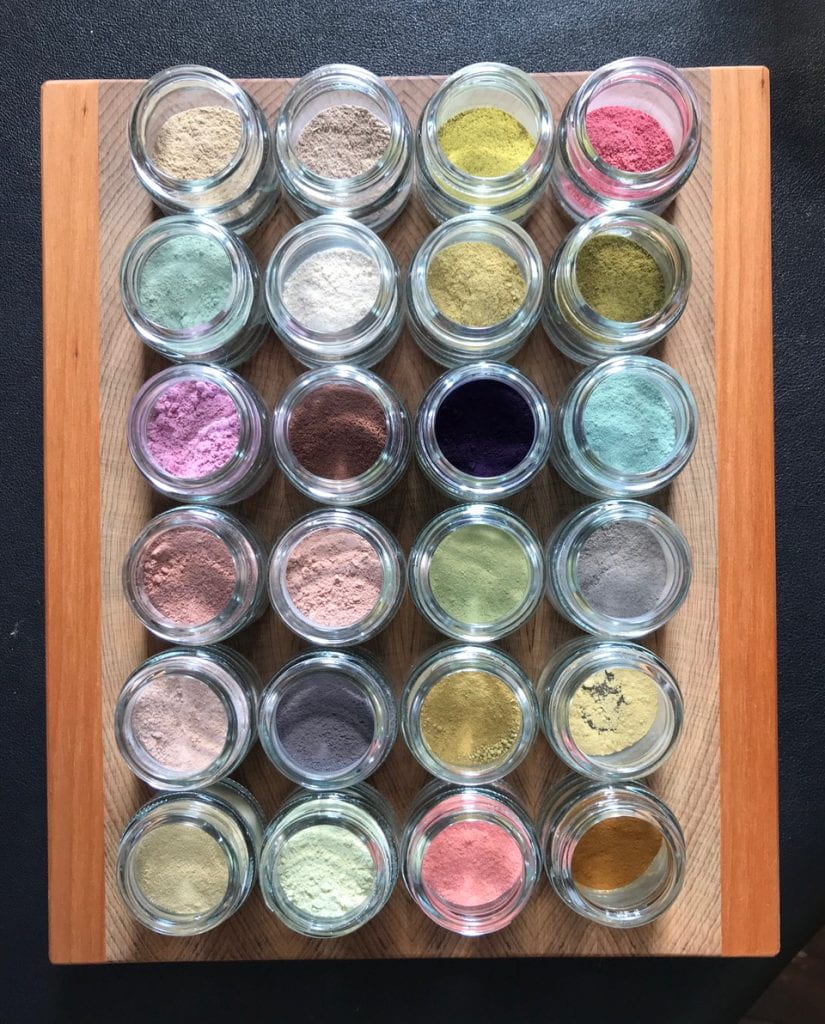The Pigment Farm: Lectures
Inaugural Lecture
Dr Emma Richardson: When is a colourant not a colourant?
Friday 26 June, 4.30pm
It will be an introduction to dyes, the origin of colour, factors that affect the colour of dyes, such as the presence of mordants, different fibre types, changes in temperature and pH, and other factors to consider during dyeing beyond the dye itself.
Emma currently holds the position of Group Lead for Analytics and Modelling at the National Physical Laboratories. Prior to joining NPL she was Associate Professor of Materials within the Department of History of Art, UCL, where her research focused on the degradation of fibre and film materials in heritage collections.
Dr Ruth Siddall: Plant to Pigment: Making lake pigments from plant dyes
Ruth Siddall is a geologist who studies the mineralogy of cultural materials; pigments, stones, ceramics and cements in archaeological and contemporary contexts. Educated at the University of Birmingham and at UCL, she has conducted research into materiality in classical and medieval archaeological contexts and has recently held the post of Scientist in Residence at the Slade School of Fine Art. She has been using this period of lockdown to improve her knowledge of organic chemistry as applied to colour and has been making dyes and lake pigments from natural plant materials.
Nicholas Laessing: Ecologies of Practice

Wednesday 22 July, 4.30pm
Nick Laessing is an artist who explores the interface between science, art and environmental issues. His current research at UCL focuses on building art installations that utilise electrolysis to decompose water into hydrogen, for use as a renewable energy. The moment he witnessed a burning flame of hydrogen transforming back into only water vapour, he realised the utopian potentials of this non-polluting clean energy.
Working between the Slade and the Electrochemical Innovation Lab, on UCL Chemical Engineering. Nick is developing small-scale, low cost electrolysers to make hydrogen that can be used in various off-grid scenarios such as providing cooking gas and gas to run repurposed car engines. Exhibited as art installations across various public contexts, these devices invite utopian reflection on how we might rethink our relationship with our environment, how we use energy and our reliance on fossil fuels. Nick and members of UCell are currently working on a solar-powered electrolyser that can provide enough hydrogen to run a Fuel Cell for public demonstrations.
Nick also teaches Navigating the Anthropocene to the BA1 at the Slade and on the Arts and Sciences BA.
Andreea Ionascu: A study on the practical applications of microbial fuel cells: from organic waste to electricity

Wednesday 29 July, 4.30pm
The prototype involves setting up microbial fuel cells (MFC) to potentially convert the organic substances present in autoclaved and diluted acid mine drainage (AMD) into electricity in an anaerobic environment, in association with a plant growth and harvest study within the p
remises of a vertical garden. It aims to monitor the production of electricity and useful
biomass along with the biogas production from digestate. The build involves accessing local/ easily accessible, reusable materials to facilitate easy replication in different locations.
Andreea Ionascu is a Slade MFA Sculpture 2019 graduate, her work focusing on artificial realities. She is currently involved in UCL PhD research with the Department of Civil, Environmental and Geomatic Engineering in collaboration with the EEL to build and create a prototype involving microbial fuel cells.
Lea Collet – Collective Listening for house plants: Plantasia (1976) & Plant Material (2017)

Wednesday 8 August, 4.30pm
Lea Collet’s work (b.1989, France) vacillates between collaboration, performance, installations, video and fiction. She introduces landscapes and subjects that investigate the possibility for contact and communication between human {the body} and plant, while poetically questioning the vocation of collective and shared commitment in the digital age. Her protean work refers to modern culture and is complemented by the unique personal experiences of each participant. Through the writing and performance of open scenarios, her productions explore technological rituals, botanical translation, social ecology, speculative storytelling and collective mythologies. Lea Collet studied at Camberwell College of Arts, London at BA level followed by an MA at Slade School of Fine Art, London. She now works at the Slade.
For the Pigment Farm lecture Lea is inviting you to a collective listening session where we will tune in with house plants. We will be listening to Mort Garson – Mother Earth’s Plantasia, a synth album from 1976 meant to help houseplants grow and Plant Material by Castle If, 2017, written, recorded, and produced by Jess Forrest. A beautiful collection of songs which capture the essence of a family of house plants.
Zoë Quick: gathering times of colour – Postponed
An invitation to walk with me for a while as I follow the Welsh wool-gatherers, who ‘gathered’ generations of shifting colours of landscape as they dyed wool with weeds of hedge and verge. As we wander together around and about ‘my field’, the mountain-archive, and peek at experiments in my dye kitchen, we’ll wonder about the temporality of colour as it relates to the processes and places of a cultural ecology…
Zoë Quick’s practice-led PhD (Bartlett-Slade) re-performs the Welsh custom gwlana (wool-gathering) as a critical spatial practice that moves between ‘farming’ and ‘re-wilding’ within fields of debate over the Welsh uplands.
 Close
Close





